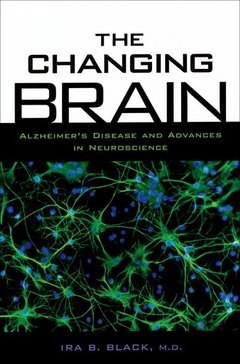Description
The Changing Brain
Alzheimer's Disease and Advances in Neuroscience
Author: Black Ira B.
Language: English
Subjects for The Changing Brain:
Publication date: 09-2003
274 p. · 15.2x22.9 cm · Paperback
274 p. · 15.2x22.9 cm · Paperback
Description
/li>Contents
/li>Biography
/li>
In The Changing Brain, Ira Black tells the fascinating story of modern neuroscience. A rich, multifaceted tale spanning a century and taking place on multiple continents, it moves from Fascist Italy, with the discovery of nerve growth factor (NGF) by a young scientist working secretly in a makeshift laboratory in her bedroom, to current experiments in which transplanted, laboratory-grown cells lead to recovery and function in damaged brain regions. In the mid 1990s, a revolutionary new concept of the brain emerged, instead of the traditional view that the brain's role in perception, memory, learning, and emotions was based on a static, non-renewable network of brain cells and connections, research revealed that the human brain is an ever-changing, fantastically complex system that is continually being shaped and reshaped by a subtle interplay of genetic clues and life experiences. To bridge the gap between abstract concepts and real-world experience, the author draws upon his expertise as a clinical neurologist to provide a dramatic account of the fictionalized story of a successful investment banker named Enoch Wallace and his battle with Alzheimer's disease, that vividly illuminates the narrative. From his first fleeting memory lapses to his final descent into dementia, each step in Wallace's decline becomes a window into another aspect of brain function and the latest groundbreaking research in neuroscience.
1: The brain connection, 2: The survival signal, 3: How to live in the brain, 4: Families, 5: Death and the brain, 6: Brain birthdays, 7: Brain glue, 8: The brain captures time, 9: Growth that kills, 10: The brain as a renewable resource
Ira B. Black, M.D., is Professor and Chairman of the Department of Neuroscience and Cell Biology at the Robert Wood Johnson Medical School in Piscataway, New Jersey. He is a past president of the Society for Neuroscience of North America and is currently Chairman of the Society's Public Information Committee. His pioneering research in neuroscience has earned him numerous awards and honors including the Jacob Javits Award from the National Institutes of Health, the Levi-Montalcini Award, and the McKnight Award.
© 2024 LAVOISIER S.A.S.




